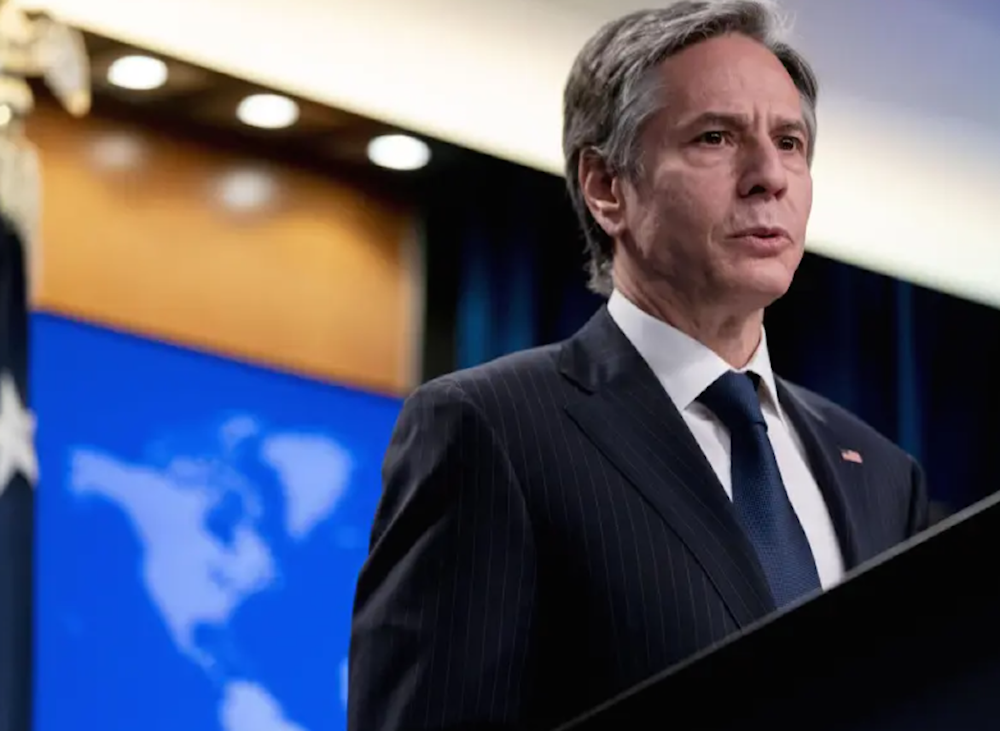State Dept: US urged nations to pass messages to Iran not to escalate
As the US sends reinforcements and warships to the region thousands of miles away from home, the US Secretary of State calls for "de-escalation".
-

Secretary of State Antony Blinken speaks at a news conference to announce the annual International Religious Freedom Report at the State Department in Washington on May 12, 2021. (AP)
US Secretary of State Antony Blinken encouraged all sides in the Middle East on Monday to avoid "escalation", according to his spokesperson, as worries rose of an impending Iranian retaliatory attack on "Israel".
Matthew Miller told reporters, "It's important that all parties take steps over the coming days to refrain from escalation and calm tensions."
Blinken talked Monday with Qatar's prime minister and Egypt's foreign minister, both significant actors in potential ceasefire negotiations days after "Israel" assassinated Hamas' head of political bureau Ismail Haniyeh in Tehran.
When asked if Iran has the right to respond, Miller stated that an Iranian assault would not benefit "the interests of the Iranian people or the broader region," warning them "don't take this step."
Miller referred to Iran's retaliatory attack on "Israel" in April after the occupation attacked the Iranian consulate in Damascus calling it a "moment of real peril for the region."
"But every time you have one of these cycles of escalation, you have a risk of parties miscalculating, you have the risk of them taking actions that get out of hand or that have unintended consequences," he stated.
It is noteworthy that the US has yet to describe the genocidal actions of "Israel" in Gaza or its aggression on Lebanon as "peril for the region."
Miller further described that countries have been urged to "pass messages to Iran and urge countries to make clear to Iran that it is very much not in their interests to escalate this conflict."
Nasser Kanaani, the spokesperson for the Iranian Foreign Ministry, said Monday that terrorism is inherent to the Israeli regime, whose survival relies on perpetuating "state terrorism", adding that Iran reserves the right to defend its national security, sovereignty, and territorial integrity and that there should be no hesitation in punishing the "adventurous Zionist regime."
He denied any contact with the Israeli occupation, asserting that "we do not need to send a message from anyone to the Zionist regime as we do not consider it legitimate in nature."
"We hold the United Nations Security Council responsible for the recent assassination in Tehran, and we have written to them and requested a meeting," he confirmed.
Iran, Hezbollah retaliation to put shaky Israeli air defenses to test
The history of Israeli invasions of Lebanon is marked by failure and "Israel’s" renowned Iron Dome air defense system risks being overwhelmed by the sheer volume of Hezbollah's missiles, suggested John Sawers, former head of the British Secret Intelligence Service MI6 and UK ambassador to the UN.
In an opinion piece published in the Financial Times, Sawers highlighted that Hezbollah poses a great threat to "Israel" with its arsenal of rockets and missiles and its claimed 100,000-strong fighters.
He mentioned that when Israeli Prime Minister Benjamin Netanyahu's military chiefs wanted to invade Lebanon after October 7, the premier "held them back."
However, according to Sawers, it seems that Netanyahu's "thinking seems to have evolved," adding that the unwritten rules that govern the low-level fighting between "Israel" and Hezbollah indicated that the assassination of top Hezbollah commander Fouad Shokor in Beirut was not justified by the missile that struck the Druze town of Majdal Shams in the occupied Syrian Golan.
"It was a deliberate escalation by Israel," he suggested.
Sawers considered that "Israel's" assassination of the head of Hamas' Political Bureau Chief Ismail Haniyeh in Tehran and Shokor in Beirut revealed Netanyahu's priorities and strategy.
The Israeli prime minister "is prepared to escalate tensions in the region rather than seeking to calm them," he pointed out.

 4 Min Read
4 Min Read








